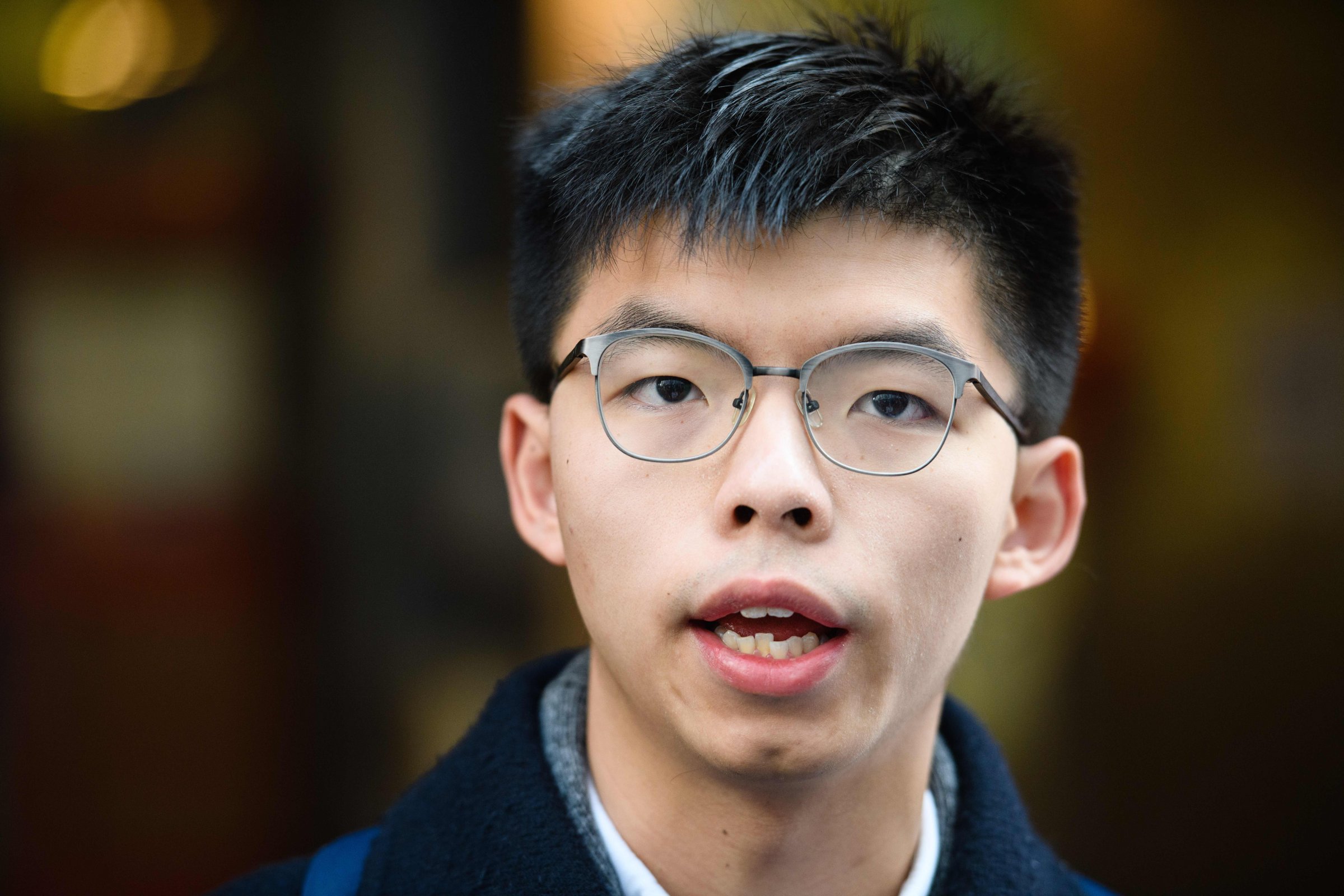
A Hong Kong democracy party said Chinese authorities detained and questioned two of its members on separate occasions for several hours in mainland China, stoking already heightened fears of Beijing’s increasingly heavy oversight of the territory’s political discourse.
Speaking to a room of local and international media Monday, leaders of one of Hong Kong’s most prominent pro-democracy political parties, Demosistō, disclosed details of the alleged detentions that occurred in March and August. They didn’t name the members who were held to protect their security.
“It’s definitely a scare tactic,” said group leader Nathan Law, sitting next to party co-founder Joshua Wong and chairman Ivan Lam. “They want to send a message to Demosistō and also the civil society in Hong Kong that you guys are not welcome in mainland China and if you come to mainland China, you may be imposed by the same threats.”
On March 26, a party member was returning to Hong Kong from the mainland following a family visit when they were detained by mainland authorities at the Shenzhen train station. Demosistō says the member was then sat in a chair with handcuffs and ankle cuffs and questioned for over three hours about the party’s political activities and names of fellow members. The member was then forced to sign a declaration that the interrogation would kept secret, and their fingerprints were taken.
The second detention occurred on Aug. 13. A second Demosistō member was similarly detained at the Guangzhou train station, taken to a hotel, and questioned for five hours about protest activity, support for Tibetan independence, and names of fellow party members. The phones of the second member were confiscated, and they were hooked up to “a machine which resembled a polygraph,” Demosistō said. The member was asked to sign an apology letter and the Ministry “suggested an amount of incentive pay should the member be able to provide more information upon return to Hong Kong,” Demosistō said in a statement.
Chinese authorities have yet to respond to request for comment.
Read More: Hong Kong Democracy Activist Joshua Wong Talks to TIME About Life Behind Bars
The alleged detentions are “not surprising,” says Dr. Sonny Lo, veteran political commentator and expert in China-Hong Kong affairs. “Demosistō is regarded as politically ‘subversive’…in the eyes of Beijing.”
“National security is regarded as the most important agenda item. Everything happens in this way. This is anticipated.”
Wong says party members have been told to take precautions about visiting the mainland, no matter how minor their involvement. “We have already recommended to our members to reassess and reconsider how to arrange personal duties, whether they should regularly visit mainland China or not.”
“When the security have forced a member to sign an apology letter, I think really shows a key signal, the scenario changed already. Once we’re involved in activism, even you just visit mainland China with your family members, you may still face pressure.”
Demosistō is a political party that advocates for the self-determination of Hong Kong. Since the former British colony was returned to China in 1997, the special administrative region has enjoyed a high degree of autonomy protected by a 50 year framework called ‘One Country Two Systems.’ The system protects Hong Kong’s political and social freedoms not found on the mainland. But some in the territory say those liberties have come under threat from China in recent years, spurring a democracy movement that rose to prominence during the 2014 Umbrella Movement, a student protest that paralyzed Hong Kong for 79 days and drew 500,000 to streets. Demosistō was formed in the wake of those protests.
This isn’t the first time activists have faced pressure from Beijing to cease their activities. Earlier this month, Hong Kong’s Foreign Correspondents’ Club drew stern condemnation from Beijing when the media hub defied its request to cancel a talk hosted by pro-independence activist Andy Chan, who is unaffiliated with Demosistō. As Chinese President Xi Jinping articulated on his visit to Hong Kong last year, any calls for independence from China cross a “red line.” But many Hong Kongers see the confrontation as a worrisome encroachment on free speech.
More Must-Reads From TIME
- The 100 Most Influential People of 2024
- Coco Gauff Is Playing for Herself Now
- Scenes From Pro-Palestinian Encampments Across U.S. Universities
- 6 Compliments That Land Every Time
- If You're Dating Right Now , You're Brave: Column
- The AI That Could Heal a Divided Internet
- Fallout Is a Brilliant Model for the Future of Video Game Adaptations
- Want Weekly Recs on What to Watch, Read, and More? Sign Up for Worth Your Time
Contact us at letters@time.com